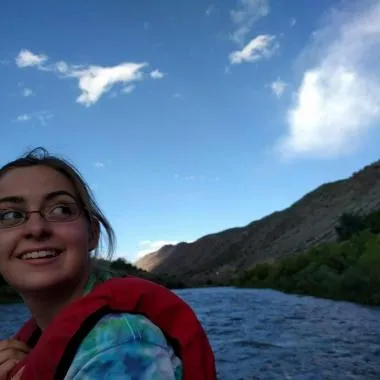
What was the most rewarding part of the internship?
Erin loved hanging out with the students as her class was diverse and was great to be in. It was reminiscent of her younger experience in school where her classes were full of diverse people, unlike college.
What was the most challenging part
The workload was difficult, but became more manageable as the semester went along and she gained more experience. It was definitely worth it.
Since finishing the BDP internship, have you completed any additional internships, volunteer, or job opportunities?
None outside of her current position.
Tell us a little about your current position (e.g., what do you do, what do you like about it, how does it/doesn’t it relate to what you studied in college).
Erin is continuing the work she started in college at the Whetstone Unit here in Tucson Arizona. In the Fall of 2018, she started going into the prison every other week to teach about the environment and gardening skills. She loved working with incarcerated students so much that she made it her job once she graduated. It has nothing to do with her major and everything to do with her want to make the world a better place for everyone, regardless of their background.
What skills, knowledge, or connections did you gain by being an intern with The Bio/Diversity Project that helped you get to where you are today?
She gained a lot of great lesson planning and science communication skills by being an intern. Additionally, she learned a lot of environmental science concepts, and have found her connections to Jill Williams and Elena Greenberg very helpful in referring herto other people and supporting her work at the Whetstone Prison Project
While The Bio/Diversity Project is an environmental science outreach program, it also aims to foster diversity and inclusion in the environmental workforce. Since being part of the program, have you had the opportunity to continue working to foster diversity and inclusivity in any way (e.g., through your job, volunteer activities, etc)? If so, please tell us how.
Yes she has! Erin's work at the prison fosters diversity by bringing environmental topics to incarcerated students. The students they serve have not been supported by society and their mission is to support them through bridges of resources. They aim to lower recidivism rates in Arizona and empower their students to be activists in their home communities.
What does it mean to be an alumni of the Bio/Diversity Project? In what ways has this internship shaped you?
It was valuable to be part of an interesting and worthwhile project. Environmental science is not super accessible, but the environment impacts everyone, and speaking to those who do not have access to environmental science personally is work that needs to be done. It was good to be part of it and helpful to draw skills from the experience for other ventures.
If you had the opportunity to leave your K-12 students that you taught as an intern in The Bio/Diversity Project a piece of advice, what would you say to them?
You are great people and should feel free to do anything you want to do.
What would you say to someone who is considering participating in the Bio/Diversity Project?
If you think you are interested in a teaching role of any sort, take this internship. It will give you real experience to make decisions about what kind of educator you want to be, and give you tools to make you a better teacher.
What’s next for you?
Currently she is figuring out her grant funded project, the Whetstone Prison Project, and how to adjust it in the time of COVID.

